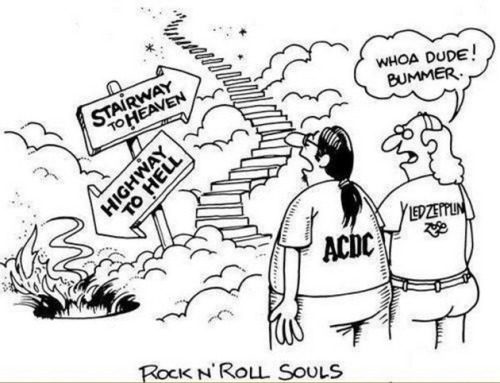
Question from social media:
Bruce, did you and Polly try other “Gods” before you deconverted?
The short answer is no. I have never thought I had to try every flavor and brand of whiskey to decide whether I like whiskey. While the flavors can be distinct and brands can differ from one another, whiskey is whiskey. I have four different brands of whiskey in our liquor cabinet. Each tastes slightly different from the others, but none to such a degree that I can’t tell I am drinking whiskey. Get a dozen whiskey aficionados in one room and ask them which whiskey is “God,” and you will get all sorts of answers. But none of them will say that this or that glass of whiskey is not whiskey. So it is with “God.”
I was born in a Christian nation, a country that prides itself in freedom of religion, yet is dominated by Christianity. I came of age in Evangelical Christianity. Saved and baptized at the age of fifteen in an Independent Fundamentalist Baptist (IFB) church, I later attended a small IFB college, married an IFB pastor’s daughter, and spent twenty-five years pastoring Evangelical (IFB, Southern Baptist, Christian Union, Sovereign Grace, and Non-denominational) churches in Ohio, Texas, and Michigan. It is Christianity — particularly Evangelicalism — that I know well. It is the religion of my tribe and my culture. It is this religion I primarily deconverted from.
I pastored my last church in 2003. Between July 2002 and November 2008, my wife and I and our children personally visited the churches listed below. These are the church names we could remember. There are others we have either forgotten or vaguely remember, so we didn’t put them on the list. Churches in bold we attended more than once. All told, from 2002-2008 we visited about 125 churches.
| Churches We Visited 2002-2008 | Location |
| Our Father’s House | West Unity, Ohio |
| First Brethren Church | Bryan, Ohio |
| First Baptist Church | Bryan, Ohio |
| Grace Community Church | Bryan, Ohio |
| Lick Creek Church of the Brethren | Bryan,Ohio |
| First Church of Christ | Bryan, Ohio |
| Eastland Baptist Church | Bryan, Ohio |
| Bryan Alliance Church | Bryan, Ohio |
| Union Chapel Church of God | Bryan, Ohio |
| Celebrate Life Christian Fellowship | Bryan, Ohio |
| Faith United Methodist Church | Bryan, Ohio |
| Trinity Episcopal Church | Bryan, Ohio |
| Archbold Evangelical Church | Archbold, Ohio |
| Sherwood Baptist Church | Sherwood, Ohio |
| Ney Church of God | Ney, Ohio |
| Ney United Methodist Church | Ney, Ohio |
| Sonrise Community Church | Ney, Ohio |
| Farmer United Methodist Church | Farmer, Ohio |
| Lost Creek Emmanuel Missionary Church | Farmer, Ohio |
| Hicksville Church of the Nazarene | Hicksville, Ohio |
| Community Christian Center | Hicksville, Ohio |
| Grace Bible Church | Butler, Indiana |
| St John’s Lutheran Church | Defiance, Ohio |
| Harvest Life Fellowship | Defiance, Ohio |
| Community Christian Center | Defiance, Ohio |
| Second Baptist Church | Defiance, Ohio |
| First Baptist Church | Defiance, Ohio |
| Grace Episcopal Church | Defiance, Ohio |
| First Assembly of God | Defiance, Ohio |
| Defiance Christian Church | Defiance, Ohio |
| First Presbyterian Church | Defiance, Ohio |
| St John’s United Church of Christ | Defiance, Ohio |
| Peace Lutheran Church | Defiance, Ohio |
| Pine Grove Mennonite Church | Stryker, Ohio |
| St James Lutheran Church | Burlington, Ohio |
| Zion Lutheran Church | Edgerton, Ohio |
| Northwest Christian Church | Edon, Ohio |
| Restoration Fellowship | Williams Center, Ohio |
| Pioneer Bible Fellowship | Pioneer, Ohio |
| Frontier Baptist Church | Frontier, Michigan |
| Salem Mennonite Church | Waldron, Michigan |
| Waldron Wesleyan Church | Waldron, Michigan |
| Lickley Corners Baptist Church | Waldron, Michigan |
| Prattville Community Church | Prattville, Michigan |
| Betzer Community Church | Pittsford, Michigan |
| Fayette Church of the Nazarene | Fayette, Ohio |
| Fayette Bible Church | Fayette, Ohio |
| Fayette Christian Church | Fayette, Ohio |
| Morenci Bible Fellowship | Morenci, Michigan |
| First Baptist Church | Morenci, Michigan |
| Demings Lake Reformed Baptist Church | Demings Lake, Michigan |
| Medina Federated Church | Medina, Michigan |
| Thornhill Baptist Church | Hudson, Michigan |
| First Baptist Church | Hudson, Michigan |
| Rollins Friends Church | Addison, Michigan |
| Canandaigua Community Church | Canandaigua. Michigan |
| Alvordton United Brethren | Alvordton, Ohio |
| Pettisville Missionary Church | Pettisville, Ohio |
| Vineyard Church | Toledo, Ohio |
| Providence Reformed Baptist Church | Toledo, Ohio |
| Lighthouse Memorial Church | Millersport, Ohio |
| Newark Baptist Temple | Heath, Ohio |
| Church of God | Heath, Ohio |
| 30th Street Baptist Church | Heath, Ohio |
| St Francis De Sales Catholic Church | Newark, Ohio |
| Bible Baptist Church | Newark, Ohio |
| Cedar Hill Baptist Church | Newark, Ohio |
| Eastland Heights Baptist Church | Newark, Ohio |
| Northside Baptist Church | Newark, Ohio |
| Newark Brethren Church | Newark, Ohio |
| St John’s Lutheran Church | Newark, Ohio |
| Vineyard of Licking County | Newark, Ohio |
| Vineyard Grace Fellowship | Newark, Ohio |
| Grace Fellowship | Newark, Ohio |
| Faith Bible Church | Jersey, Ohio |
| Vineyard Christian Church | Pataskala, Ohio |
| Cornerstone Baptist Church | New Lexington, Ohio |
| St Nicolas Greek Orthodox Church | Fort Wayne, Indiana |
| Nondenominational Church | Angola, Indiana |
| Nondenominational Church | Fremont, Indiana |
| Victory Baptist Church | Clare, Michigan |
| First Assembly of God | Yuma, Arizona |
| Desert Grace Community Church | Yuma, Arizona |
| Calvary Lutheran Church | Yuma, Arizona |
| Bible Baptist Church | Yuma, Arizona |
| Calvary Chapel | Yuma, Arizona |
| Oasis | Yuma, Arizona |
| Faith Baptist Church | Yuma, Arizona |
| Valley Baptist Church | Yuma, Arizona |
| Calvary Assembly of God | Yuma, Arizona |
| Foothills Assembly of God | Yuma, Arizona |
| Morningside Baptist Church | Yuma, Arizona |
| Faith Horizons Baptist Church | Yuma, Arizona |
| Stone Ridge Baptist Church | Yuma, Arizona |
| Old Order Mennonite Church | Yuma, Arizona |
| Grace Bible Fellowship | Yuma, Arizona |
| Calvary Temple of Christ | Yuma, Arizona |
| Maranatha Baptist Church | Yuma, Arizona |
| Independent Lutheran Church | Yuma, Arizona |
| Community Christian Church | Yuma, Arizona |
| Church meeting in funeral chapel | Yuma, Arizona |
| Pentecostal Church | Winterhaven, California |
| North Holtville Friends Church | Holtville, California |
| Sierra Vista Baptist Church | Sierra Vista, Arizona |
| Hedgesville Baptist Church | Hedgesville, West Virginia |
| New Life Baptist Church | Weston, West Virginia |
As you can see, we covered our bases when it came to organized Christianity. We didn’t visit any IFB churches, nor did we focus solely on Evangelical congregations. Been there, done that, right? Seen one, seen them all? Go ahead and start whining now. I know, I know, your church is DIFFERENT! Sure it is.
We saw no need to visit Jewish or Muslim congregations. While there are differences between the three Abrahamic religions, not so much so that you can’t determine their veracity without immersing yourself in their writings. All three are text-based monotheistic religions that allegedly worship the same deity.
We understood that we were frail, finite beings, marching one step at a time towards death. Having been taught that non-Christians would spend eternity being tortured by God in a burning Lake of Fire, we were naturally fearful about choosing the wrong religion or worshipping the wrong God. Once we determined that the Bible was not what Evangelicals claimed it was and the central claims of Christianity were false, we lost our fear of Hell. Not right away. It took time to undo five decades of religious indoctrination and conditioning.
Granted, some Christians reject a literal Hell and eternal punishment, crafting all sorts of workarounds meant to not make God look like the monster he most certainly is. I read several books on annihilationism, universalism, etc., and concluded that all of them were intellectually lacking; written by authors who couldn’t bear to let go of God and their chosen religion. (And I am not suggesting their writing was without merit. I just concluded that their views were not intellectually compelling; not enough to sway me to their side.)
I am an agnostic atheist. While I can’t say for certain that no gods exist, I am confident that they don’t. I could be wrong, but I doubt that I am. When it comes to the Christian deity, I am convinced that he is a work of fiction. No amount of reading or study will convince me otherwise. I have studied the lay of land, having spent decades reading the Bible and Christian theology. I can’t imagine a Christian apologist saying something or making an argument that I have not heard before. Thus, I have closed the book on Christianity. Perhaps, in the future, a God not yet known will reveal itself to us. If that happens, I will consider that God’s or its follower’s claims accordingly (if he or she makes any).
Humans worship countless Gods. According to Wikipedia — the one true God — there are approximately 4,200 world religions or denominations. Need I study all of them, attend their worship services, or read their texts before I conclude they are false? No. It would take a lifetime to do so — a waste of time if there ever was one. Remove the religions that threaten judgment and eternal punishment, there is nothing left to fear. Religion then becomes personal and social in nature; that which meets felt needs and gives people meaning and purpose. I have no need of religion to find these things. Secular humanism provides the ethical and moral foundation for my life, and family gives me all the meaning and purpose I need. I have no thoughts about life after death. I don’t want to die, but I know it is inevitable. I don’t fret over that which I cannot control. I choose to live for the moment; to live each day the best I can, surrounded by those who matter to me. Even though my body is wracked with horrible pain, I try to find enjoyment in life. Having six children, sixteen grandchildren, and three cats gives me plenty of opportunities to enjoy life, as does watching wild animals and stray/ferals cats in our backyard, working in the yard, building my model train layout, taking country drives with Polly and Bethany, and writing for this blog. I have much to enjoy in life — all without God.
Bruce Gerencser, 68, lives in rural Northwest Ohio with his wife of 47 years. He and his wife have six grown children and sixteen grandchildren. Bruce pastored Evangelical churches for twenty-five years in Ohio, Texas, and Michigan. Bruce left the ministry in 2005, and in 2008 he left Christianity. Bruce is now a humanist and an atheist.
Your comments are welcome and appreciated. All first-time comments are moderated. Please read the commenting rules before commenting.
You can email Bruce via the Contact Form.







